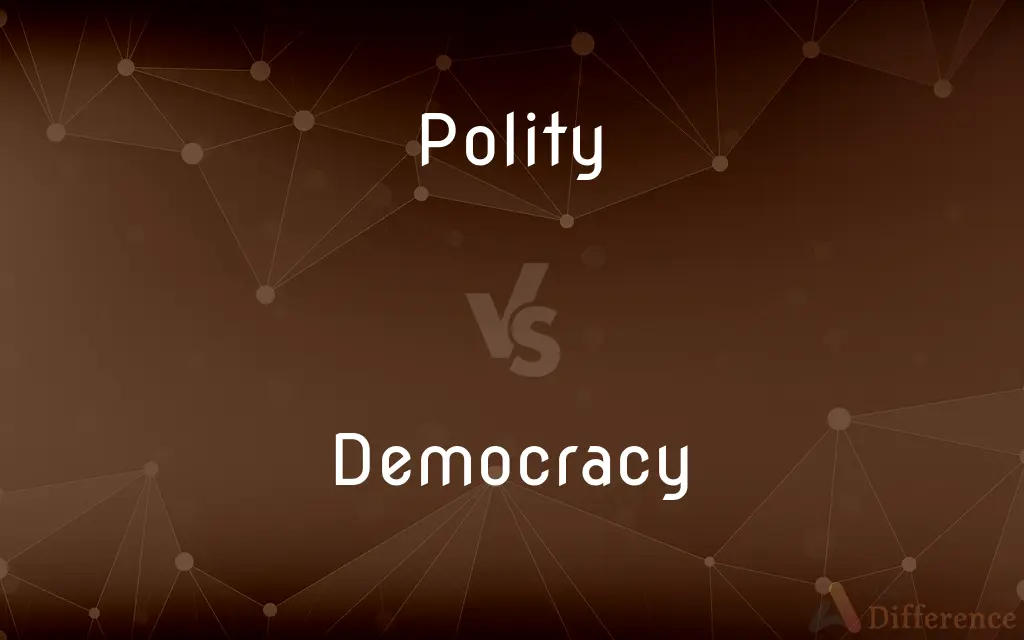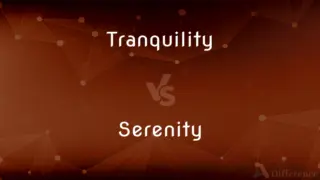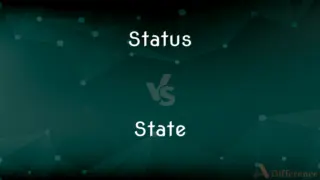Polity vs. Democracy — What's the Difference?
Edited by Tayyaba Rehman — By Urooj Arif — Updated on March 5, 2024
Polity refers to a form or process of civil government or constitution, whereas democracy is a specific type of polity characterized by a system where power is held by the people or their elected representatives.

Difference Between Polity and Democracy
Table of Contents
ADVERTISEMENT
Key Differences
Polity is a broad term that encompasses various forms of governance and organizational structures of a society or state. It refers to the collective institutions, laws, and practices that define the political structure of a state. This can include democracies, monarchies, dictatorships, and other forms of government. Democracy, on the other hand, is a specific form of polity where the principle of popular sovereignty prevails, meaning that power ultimately resides in the hands of the people, either directly or through elected representatives.
While polity can be understood as the overarching framework that includes the mechanisms and structures of governance, democracy focuses specifically on the engagement and empowerment of the populace within this framework. Democracies are characterized by free and fair elections, protection of human rights, and the rule of law, elements that may or may not be present in other forms of polity.
The concept of polity is neutral with respect to the values and procedures of governance, serving as an analytical tool to understand the organization of society and its governing rules. Democracy, however, inherently carries a value judgment, suggesting a system that aims for equality, freedom, and the active participation of citizens in the political process.
Polity as a concept allows for the analysis and comparison of different government systems by their structures and functions, without implying a specific ideological stance. Democracy explicitly promotes the idea of egalitarianism and participatory governance, emphasizing the role of individuals in shaping their government and policies.
The term "polity" is used in discussions and analyses that seek to understand the general nature of a society's political system, including its stability, inclusivity, and adaptability. Democracy is often discussed in the context of advocating for more open and participatory governance, critiquing authoritarian regimes, or exploring the challenges of implementing democratic principles in diverse societies.
ADVERTISEMENT
Comparison Chart
Definition
The form or process of civil government or constitution.
A system of government by the whole population or all the eligible members of a state, typically through elected representatives.
Scope
Broad, encompassing various forms of governance.
Specific, referring to popular sovereignty and participation.
Characteristics
Neutral regarding governance values.
Emphasizes egalitarianism, freedom, and participation.
Key Elements
Structures and functions of governance.
Free elections, human rights, rule of law.
Focus
Organizational structure of society and state.
Engagement and empowerment of the populace.
Value Judgment
Analytical, without inherent ideological stance.
Carries implications of desired equality and freedom.
Application
General analysis of political systems.
Advocacy for participatory governance, critique of authoritarianism.
Compare with Definitions
Polity
Reflects the administrative and legal order.
The new constitution redefined the nation's polity.
Democracy
Governance by the people, directly or via representatives.
The nation prides itself on its strong tradition of democracy.
Polity
XA system of governance or political organization.
The country's polity has evolved significantly over the centuries.
Democracy
Protection of human rights and rule of law.
Advocates argue that democracy is the best protector of individual freedoms.
Polity
Analytical framework for governance.
His research focuses on the polity of emerging economies.
Democracy
Involves active citizen participation.
Democracy thrives when citizens engage in the political process.
Polity
The structure of political institutions and laws.
Scholars study the polity to understand societal changes.
Democracy
A system aimed at equality and freedom.
Democracy seeks to balance government authority with individual rights.
Polity
Neutral term for any form of government.
The concept of polity encompasses democracies and monarchies alike.
Democracy
Emphasizes free and fair elections.
International observers verified the democracy of the electoral process.
Polity
The form of government of a nation, state, church, or organization.
Democracy
Democracy (Greek: δημοκρατία, dēmokratiā, from dēmos 'people' and kratos 'rule') refers to a form of government in which the people either have the authority to choose their governing legislators, or the authority to decide on legislation. Who is considered part of the people and how authority is shared among or delegated by the people has changed over time and at different speeds in different countries, but more and more of the inhabitants of countries have generally been included.
Polity
A polity is an identifiable political entity—any group of people who have a collective identity, who are organized by some form of institutionalized social relations, and have a capacity to mobilize resources. A polity can be any other group of people organized for governance (such as a corporate board), the government of a country, country subdivision, or a sovereign state.
Democracy
Government by the people, exercised either directly or through elected representatives.
Polity
An organized society, such as a nation, having a specific form of government
"His alien philosophy found no roots in the American polity" (New York Times).
Democracy
A political or social unit that has such a government.
Polity
The form or constitution of the civil government of a nation or state; the framework or organization by which the various departments of government are combined into a systematic whole.
Democracy
The common people, considered as the primary source of political power.
Polity
The form of government of a social organization
Democracy
Government by the people; a form of government in which the supreme power is retained and directly exercised by the people.
Democracy
Collectively, the people, regarded as the source of government.
Democracy
The political orientation of those who favor government by the people or by their elected representatives
Democracy
A political system in which the supreme power lies in a body of citizens who can elect people to represent them
Common Curiosities
Can a democracy be considered a polity?
Yes, democracy is a specific type of polity characterized by its emphasis on popular governance and citizen participation.
What are the key features of a democracy?
Key features of democracy include free and fair elections, protection of human rights, the rule of law, and active citizen participation.
Why is polity important in political science?
Polity is important as it provides an analytical framework to study and compare different forms of governance and their impact on society.
How do polity and democracy impact governance?
Both concepts impact governance by defining the structures and principles under which political activity occurs, with democracy emphasizing the role of citizen engagement and equality.
What defines a democracy?
Democracy is defined by the principle of popular sovereignty, where power resides in the hands of the people, either directly or through elected representatives.
What role do citizens play in a democracy?
Citizens play a crucial role in a democracy by participating in elections, engaging in political discourse, and holding their representatives accountable.
How does polity differ from democracy?
Polity is a broader term that includes any form of government organization, while democracy specifically refers to a system based on popular sovereignty and participation.
What is polity?
Polity refers to the form or process of government and political organization of a society or state, encompassing various governance structures.
What challenges do democracies face?
Democracies face challenges such as maintaining fair elections, ensuring widespread participation, protecting minority rights, and combating misinformation.
How is the concept of polity used in academic research?
In academic research, polity is used to analyze and categorize the varying structures and functions of government systems across different societies and historical periods.
What is the significance of studying both polity and democracy?
Studying both concepts is significant for understanding the range of governmental structures and the importance of popular sovereignty and citizen participation in shaping democratic governance.
How can a polity transition to a democracy?
A polity can transition to a democracy through reforms that expand citizen participation, ensure fair elections, and protect rights and freedoms.
What makes democracy unique among other polities?
Democracy is unique for its emphasis on egalitarianism, the involvement of the populace in governance, and the safeguarding of freedoms and rights.
Can the principles of democracy be applied in all polities?
While the principles of democracy are universally valued, their application varies based on cultural, historical, and societal contexts within different polities.
How do changes in polity affect a society?
Changes in polity can significantly impact a society by altering its governance structure, laws, and the relationship between the state and its citizens.
Share Your Discovery

Previous Comparison
Tranquility vs. Serenity
Next Comparison
Status vs. StateAuthor Spotlight
Written by
Urooj ArifUrooj is a skilled content writer at Ask Difference, known for her exceptional ability to simplify complex topics into engaging and informative content. With a passion for research and a flair for clear, concise writing, she consistently delivers articles that resonate with our diverse audience.
Edited by
Tayyaba RehmanTayyaba Rehman is a distinguished writer, currently serving as a primary contributor to askdifference.com. As a researcher in semantics and etymology, Tayyaba's passion for the complexity of languages and their distinctions has found a perfect home on the platform. Tayyaba delves into the intricacies of language, distinguishing between commonly confused words and phrases, thereby providing clarity for readers worldwide.















































